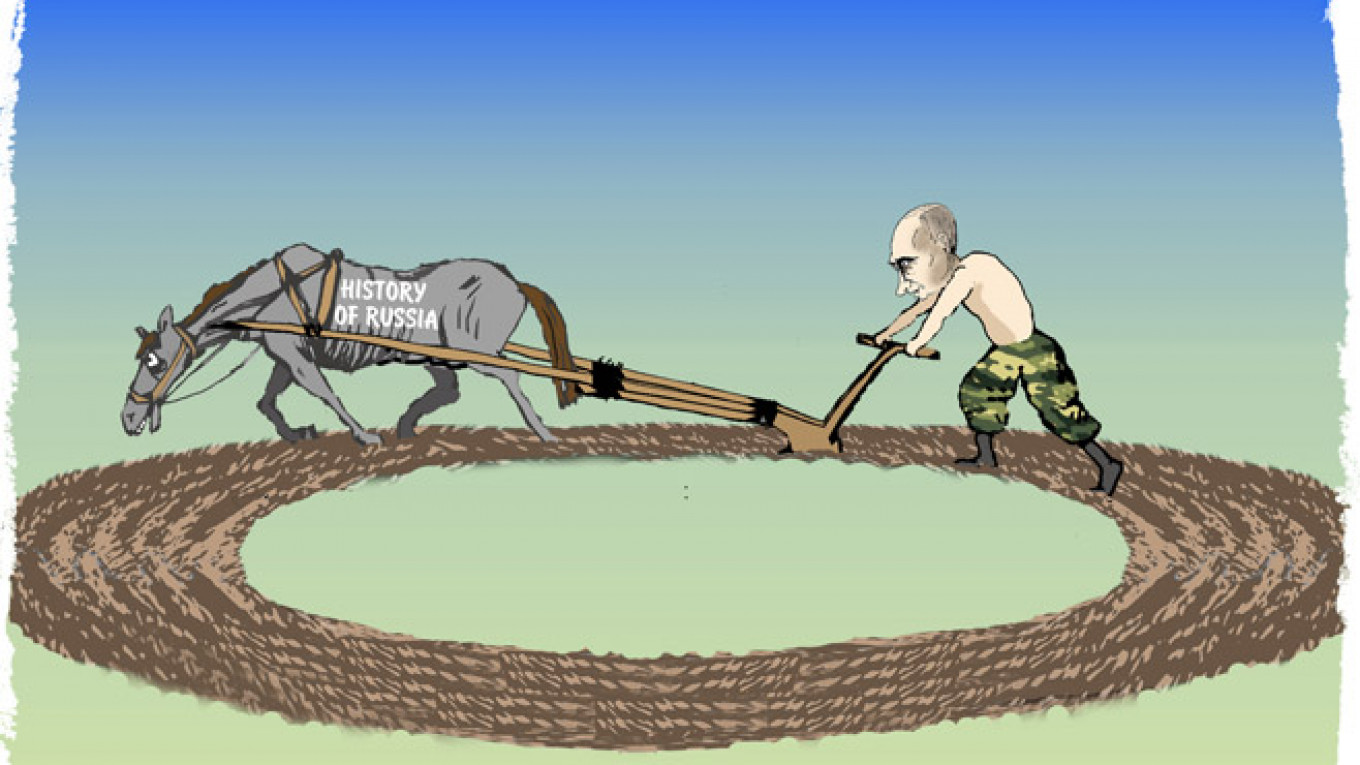Russian diplomacy has always frowned on sanctions as tool for international policy. This is not only because the West has applied sanctions to countries with longstanding relations with Moscow such as Yugoslavia, Iraq, Libya, Iran — and now, Russia itself.
The logic of a "sanctions war" is very simple. First, if the country in question is not willing to surrender — and even the very smallest countries rarely are — the besieged government feels compelled to respond in kind, sparking a tit-for-tat exchange. Second, each successive move must cause more hardship and pain than the previous one. And once the storehouse of retaliatory measures is exhausted, all that remains is to engage in direct conflict.
In fact, the only example of an effective use of sanctions concerns South Africa during the apartheid era. But that is a very unique case because the regime built its authority on the principle of racial segregation and wound up without supporters anywhere in the world.
Some observers also point to the example of Iran, but it remains unclear how that saga will finally end. Although the unusually strict sanctions forced Tehran to muster its best diplomatic skills and open talks on its nuclear program, the final result remains to be seen. Only one thing is certain: In both cases, sanctions were lifted only after the ruling regimes changed. The West might not have declared that as their goal, but it was the main result they achieved.
The current sanctions against Russia are unprecedented in their scale and reach. Though in one sense, Prime Minister Dmitry Medvedev was correct when he said at the Sochi Economic Forum that this country lived under various sanctions throughout most of the 20th century and that this situation was nothing new.
But that comparison does not hold water because the Soviet Union deliberately isolated itself from the outside world, planning to eventually spread its own ideology around the globe and thus incorporate the "capitalist West" into the communist system. As history has shown, that proved impossible.
Current events could be compared to another of Russia's breaking points, 1917 — the point at which the Russian Empire was gone forever and its successor state became an international pariah. Hit by sanctions that fundamentally changed its status in the international system, Soviet Russia was placing its bets on autarchy, or creating a closed and self-sufficient economy.
I am in no way suggesting that post-Crimea Russia is analogous to the country that emerged from the flames of the 1917 revolution. I am saying that once the ruling authorities in a country have been deemed unfit by foreign partners, they can never fully repair relations with them.
One possible exception to that rule is Belarussian President Alexander Lukashenko, with his constantly alternating overtures to both Moscow and Europe. However, his ability to settle on a dancing partner is more a function of President Vladimir Putin's foreign policy than his own. In the end, nobody doubts that the U.S. and the EU would prefer a radical regime change in Belarus.
Following the end of the Cold War, Russia's dialogue with the West as a whole, but especially with Europe, was based on the assumption that Russia would eventually become part of an extended "Western society," although both sides had different ideas of how that would happen and Moscow's ultimate role in it. However, they retained the idea of a "strategic partnership," a relationship that required if not sincere mutual trust, then at least mutual silence to mask lingering suspicions. The application of sanctions has ended all that.
The current situation is complicated by the fact that these sanctions target specific individuals. By contrast, none of the Cold War-era efforts to contain the Soviet Union were designed to change its political system. They were aimed at limiting Moscow's foreign policy ambitions and weakening its overall capacity to mount a serious confrontation.
Today, a single man personifies the entire Russian political system. Western attempts to apply pressure against him have produced very predictable retaliatory measures at both the personal and government levels. And unlike the former presidents of Iraq and Serbia, President Putin has very imposing political and economic tools at his disposal to enact his own retaliatory deterrence measures. In effect, Western sanctions are attempting to oust the very person who alone determines Russia's political course.
For Putin, the question is not simply one of winning or losing a tactical position in a game. At stake is his own political survival and, by extension, Russia's future political landscape. With the stakes that high, why would anyone expect him to make serious concessions, especially knowing that he can never restore relations with the West?
The era in which Russia delineates its post-Soviet identity while developing a qualitatively different relationship with its former opponents has ended. A Soviet renaissance is impossible. But because Russia has fully rejected the pro-Western and pro-democratic model that emerged soon after the collapse of the Soviet Union, Moscow can no longer be said to oppose the old Soviet model of self-positioning.
Ironically, it was the Soviet collapse that enabled today's Russian leaders to attain their current levels of wealth and power. Had the Soviet Union survived, none of them would have enjoyed anything close to their current status.
It happens that 23 years have passed since the revolution of 1991. The same number of years separated the October Revolution that swept away the Russian Empire from the date when the Soviet leader — himself a product of that revolution — abandoned a revolutionary ideological course in favor of geopolitical expansion and the restoration of Russia's traditional imperial position. It seems that a new cycle of Russian history is beginning.
Fyodor Lukyanov is editor of Russia in Global Affairs.
A Message from The Moscow Times:
Dear readers,
We are facing unprecedented challenges. Russia's Prosecutor General's Office has designated The Moscow Times as an "undesirable" organization, criminalizing our work and putting our staff at risk of prosecution. This follows our earlier unjust labeling as a "foreign agent."
These actions are direct attempts to silence independent journalism in Russia. The authorities claim our work "discredits the decisions of the Russian leadership." We see things differently: we strive to provide accurate, unbiased reporting on Russia.
We, the journalists of The Moscow Times, refuse to be silenced. But to continue our work, we need your help.
Your support, no matter how small, makes a world of difference. If you can, please support us monthly starting from just $2. It's quick to set up, and every contribution makes a significant impact.
By supporting The Moscow Times, you're defending open, independent journalism in the face of repression. Thank you for standing with us.
Remind me later.








